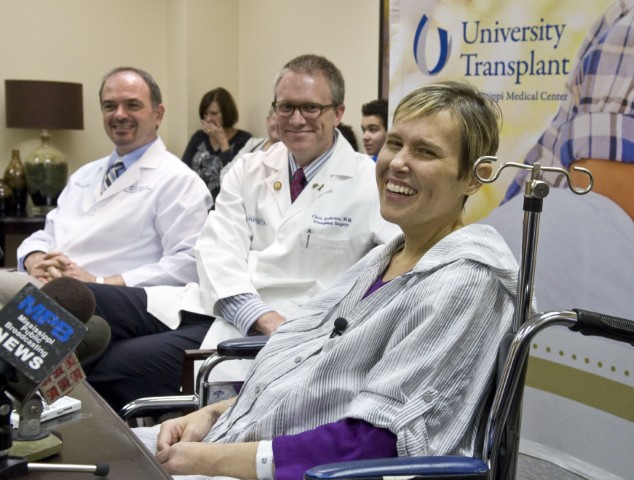UMMC Transplant team completes first liver case in 22 years

In an operation that gave a Jackson mother a new chance at life, a team at the University of Mississippi Medical Center earlier this month successfully completed the state’s first liver transplant in 22 years.
The recipient Karen Battle, received her new liver on March 4 and is headed back to her south Jackson home today, said Dr. Christopher Anderson, UMMC associate professor of transplant surgery and division chief of transplant and hepatobiliary surgery.“They’ve given me my life back,” Battle said of the University Transplant team, the donor and donor’s family. “I’ve learned that you should celebrate every moment you have. If you’re holding back, waiting for something special, don’t. Live and enjoy it now.”
Autoimmune hepatitis, a condition brought on in 2009 through no fault of her own, turned Battle’s immune system against her own liver causing cirrhosis.
Through the last four years she fought the disease with the help of specialists from Nashville to New Orleans. Despite those efforts, her condition worsened and it became clear Battle, 36, would eventually need a new liver.
More than a year ago, a specialist at Vanderbilt University put her in touch with Anderson, who had moved back to his native Mississippi from Washington University in St. Louis.
On arrival at UMMC, Anderson had begun building the team of specialists and meeting the regulatory requirements to restart UMMC’s liver transplant program.
“One person cannot do transplants. It takes a team of specialists – a hepatologist, surgeons, anesthesiologists – institutional support, commitment from administration, nursing and support staff to make a transplant program work,” he said.
One of the physicians he hired is Dr. Brian Borg, associate professor of digestive diseases and the state’s only transplant hepatologist, who joined the team in August. Another is Dr. Mark Earl, assistant professor of transplant surgery.
At the end of January the United Network for Organ Sharing, the governing body for organ transplantation in the U.S., approved UMMC’s liver transplant program.
Battle’s condition worsened throughout February to the point where she was admitted to UMMC’s Wallace Conerly Hospital for Critical Care on Feb. 27 and was put on UMMC’s liver transplant list.
“She was in end-stage liver disease and at that point many other organs are affected. Her kidneys had stopped producing urine. We recognized she was spiraling downward,” Anderson said.
“She was, in my opinion, straddling the fence of being a good candidate to even go through the procedure versus, if she gets much sicker, we’re going to have to say transplant’s not going to help.”
Only days after getting Battle admitted and listed, Anderson got a call saying a suitable liver was available. Earl went to procure it. At about 9:30 p.m. on March 4 transplant team members began prepping Battle to remove her severely damaged liver.
Earl returned with the donated organ and the transplant continued, ending in the early morning hours of March 5.
“This was a complex case and Karen’s condition was very fragile. For our first case we had wanted a more simple case, but our team worked together just like we’d wanted,” Anderson said.
Borg said the chances of Battle’s survival were very low if she had not received the organ.
Battle’s mother, Kay Riley, supported her daughter throughout the diagnosis, disease, transplant and recovery.
“I have this perfect daughter who didn’t smoke or drink. She’s church-going and all of a sudden she has cirrhosis of the liver,” Riley said.
The trips to New Orleans and Nashville were expensive and time-consuming, Riley said. Having a liver transplant program in Jackson – practically her daughter’s backyard – made the difference.
“She was almost dead when we got word of the new liver. I don’t think she would have made it if we had to go to another state for the transplant,” Riley said. “People should really always consider donating an organ. It could save someone’s life.”
Battle said she’s incredibly grateful to the donor the donor’s family. Though privacy laws keep recipient and donor families from directly exchanging names and contact information, third-party organizations such as the Mississippi Organ Recovery Agency can arrange that exchange if both sides agree.
The liver program marks the second-to-last step in building University Transplant’s complete abdominal transplant line. The team broke a UMMC record last year with 103 kidney transplants. Now, only pancreas transplantation remains, which Anderson said may come later this year.
Anderson said he expects University Transplant will handle 10-15 liver transplants this year.
“There are a lot of unsung heroes here,” Anderson said. “Transplant floor nurses, intensive care unit nurses, administration, dialysis nurses, blood bank staff, liver transplant coordinators and nephrologists were all key in making Karen’s case a success.”
As Battle headed home 10 days after receiving her new liver, she said she’ll be forever grateful to Anderson, his team and her donor. And though she’ll continue needing follow-up care, the drive will be short.


